Boost your SAT vocabulary with our latest blog, where we’ll share expert SAT tips to help you master those tricky SAT vocabulary words. Whether you’re just starting your SAT prep or looking to brush up on vocabulary skills, our blog has got you covered. SAT vocabulary words are essential to success on the SAT, and we’re here to help you tackle them with confidence. So, let’s dive in!
Understanding SAT Vocabulary

The SAT mainly tests vocabulary using sentence completion and passage-based questions
Sentence Completion questions, which were prevalent in the old SAT, required test-takers to choose the correct vocab word for an isolated sentence.These questions are no longer present in the current SAT. Instead, all vocab questions are based on reading passages and are integrated into the SAT Reading and Writing and Language sections.
Key Word Types
Common vocabulary words tested on the SAT include synonyms, antonyms, and context-based words. The SAT focuses on testing medium-difficulty words, usually ones with multiple meanings. The exam does not test obscure words or those that were prevalent in older versions of the test.
Unveiling Word Meanings
Context is crucial in answering SAT vocabulary questions. Context provides clues about the meaning and usage of words, helping students make educated guesses even if they are unfamiliar with the specific vocabulary. By paying attention to the surrounding words, phrases, and sentences, students can infer the intended meaning of a word and select the most appropriate answer choice.
Interpreting Vocabulary in Context
The SAT tests vocabulary in context, meaning that test-takers must use context clues to interpret the meaning of a word in a passage. This makes memorizing SAT vocabulary words less important than understanding how to use them in context.
Related Reading
Strategies For Learning SAT Vocabulary Words

Contextual Reading
Reading articles, essays, and books that are slightly above your current reading level can help you understand how words are used in real-life situations. You can infer the meanings of unfamiliar words from the context.
Flashcards
Creating flashcards with words on one side and definitions on the other helps in reviewing regularly. Focus on the most challenging words to improve retention.
Word Maps or Semantic Maps
Creating visual representations of word meanings with synonyms, antonyms, related words, and example sentences helps in making connections between words, aiding in retention.
Word Games and Puzzles
Engaging in word games like crossword puzzles, word searches, or online vocabulary quizzes can make learning fun and interactive. These activities reinforce memory of words.
Use Them in Writing and Speaking
Practicing incorporating SAT vocabulary words into everyday writing and speaking can solidify understanding and recall of words.
Write, Study, And Research 10x Faster
Studying new material isn’t easy but tedious, time-consuming, and repetitive. Conch steps in so you can focus on learning. With Conch, you can upload your course material (Upload class notes, documents, lectures, videos, and more) and generate studysets live (Record your lectures, meetings, presentations, or interviews to watch notes and flashcards generate live).
AI Detection Evasion with ConchAI
At Conch, we guarantee that there’s a 99.99% that you won’t get caught after using our tool. If you use ConchAI to write your essays you will be undetected by algorithms like GPTZero and TurnItIn. With Conch, you can write your essays 10x faster, AI detection-free. Our tool helps you add citations, it helps you rewrite content so that it’s undetectable by AI, and so much more, all to protect students’ time and let them focus on actually learning the content!
Conch: Simplifying Student Life
So Chegg users, High School and college students, and anyone writing papers, use Conch to make your student life easier and bypass AI detection tools with ease. Conch has over +1 million users to date and growing.
Sign up and use Conch’s AI Essay writer and Study for free for free today.
201 Must-Know SAT Vocabulary Words To Learn
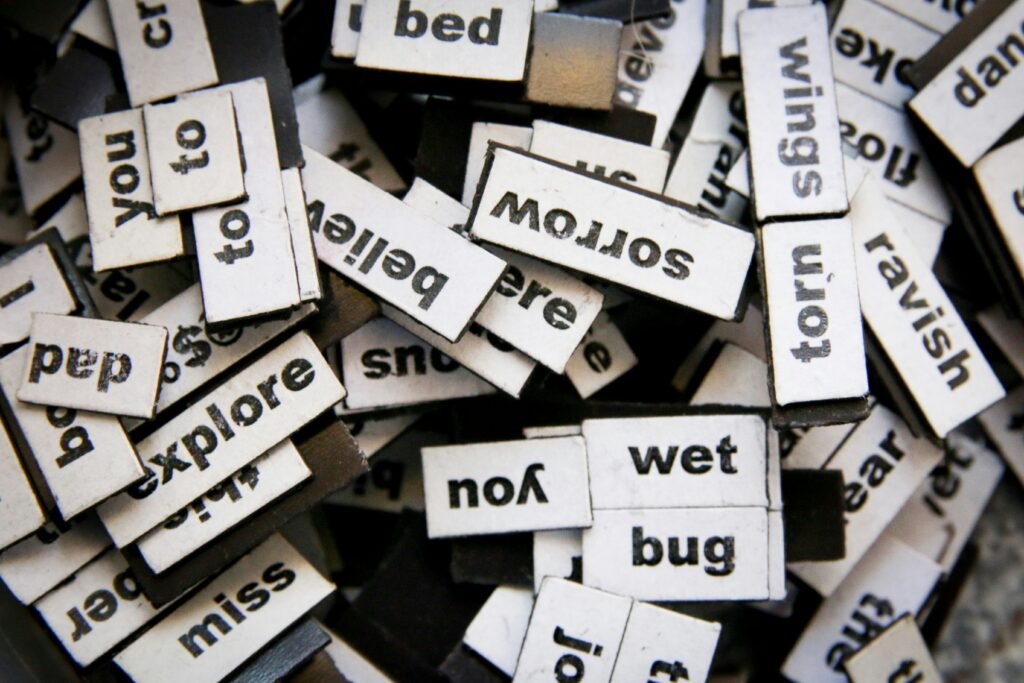
1. Abate – (verb) to become less intense or widespread.
2. Abhor – (verb) to regard with disgust or hatred.
3. Abridge – (verb) to shorten without losing the sense or meaning.
4. Benevolent – (adjective) well-meaning and kindly.
5. Capitulate – (verb) to cease to resist an opponent or demand; surrender.
6. Deleterious – (adjective) causing harm or damage.
7. Ephemeral – (adjective) lasting for a very short time.
8. Fortuitous – (adjective) happening by chance rather than intention.
9. Garrulous – (adjective) excessively talkative, especially on trivial matters.
10. Hackneyed – (adjective) lacking significance through having been overused; unoriginal and trite.
11. Incessant – (adjective) continuing without pause or interruption.
12. Jubilant – (adjective) feeling or expressing great happiness and triumph.
13. Kindle – (verb) to ignite, arouse, or inspire (an emotion or feeling).
14. Lament – (verb) to mourn a loss or express sorrow.
15. Malicious – (adjective) intending to do harm.
16. Nebulous – (adjective) in the form of a cloud or haze; hazy.
17. Obstinate – (adjective) stubbornly refusing to change one’s opinion or course of action.
18. Paradigm – (noun) a typical example or pattern of something; a model.
19. Querulous – (adjective) complaining in a petulant or whining manner.
20. Reclusive – (adjective) avoiding the company of other people; solitary.
21. Serene – (adjective) calm, peaceful, and untroubled; tranquil.
22. Taciturn – (adjective) reserved or uncommunicative in speech; saying little.
23. Ubiquitous – (adjective) present, appearing, or found everywhere.
24. Vehement – (adjective) showing strong feeling; forceful, passionate, or intense.
25. Whimsical – (adjective) playfully quaint or fanciful, especially in an appealing and amusing way.
26. Xenophobia – (noun) intense or irrational dislike or fear of people from other countries.
27. Zealot – (noun) a person who is fanatical and uncompromising in pursuit of their religious, political, or other ideals.
28. Altruistic – (adjective) showing a disinterested and selfless concern for the well-being of others; unselfish.
29. Belligerent – (adjective) hostile and aggressive.
30. Clandestine – (adjective) kept secret or done secretively, especially because illicit.
31. Disparate – (adjective) essentially different in kind; not allowing comparison.
32. Enigma – (noun) a person or thing that is mysterious, puzzling, or difficult to understand.
33. Facetious – (adjective) treating serious issues with deliberately inappropriate humor; flippant.
34. Gullible – (adjective) easily persuaded to believe something; credulous.
35. Hapless – (adjective) unfortunate; having no luck.
36. Inexorable – (adjective) impossible to stop or prevent.
37. Juxtapose – (verb) to place or deal with close together for contrasting effect.
38. Kindle – (verb) to ignite, arouse, or inspire (an emotion or feeling).
39. Lament – (verb) to mourn a loss or express sorrow.
40. Malicious – (adjective) intending to do harm.
41. Nebulous – (adjective) in the form of a cloud or haze; hazy.
42. Obstinate – (adjective) stubbornly refusing to change one’s opinion or course of action.
43. Paradigm – (noun) a typical example or pattern of something; a model.
44. Querulous – (adjective) complaining in a petulant or whining manner.
45. Reclusive – (adjective) avoiding the company of other people; solitary.
46. Serene – (adjective) calm, peaceful, and untroubled; tranquil.
47. Taciturn – (adjective) reserved or uncommunicative in speech; saying little.
48. Ubiquitous – (adjective) present, appearing, or found everywhere.
49. Vehement – (adjective) showing strong feeling; forceful, passionate, or intense.
50. Whimsical – (adjective) playfully quaint or fanciful, especially in an appealing and amusing way.
51. Accolade – (noun) an award or privilege granted as a special honor or as an acknowledgment of merit.
52. Belittle – (verb) make (someone or something) seem less impressive or important.
53. Candor – (noun) the quality of being open and honest in expression; frankness.
54. Debilitate – (verb) make (someone) weak and infirm.
55. Eclectic – (adjective) deriving ideas, style, or taste from a broad and diverse range of sources.
56. Fabrication – (noun) the action or process of manufacturing or inventing something.
57. Garner – (verb) gather or collect (something, especially information or approval).
58. Harbinger – (noun) a person or thing that announces or signals the approach of another.
59. Impeccable – (adjective) in accordance with the highest standards; faultless.
60. Judicious – (adjective) having, showing, or done with good judgment or sense.
61. Kinetic – (adjective) of, relating to, or resulting from motion.
62. Luminous – (adjective) full of or shedding light; bright or shining, especially in the dark.
63. Malleable – (adjective) able to be hammered or pressed permanently out of shape without breaking or cracking.
64. Nefarious – (adjective) (typically of an action or activity) wicked or criminal.
65. Opaque – (adjective) not able to be seen through; not transparent.
66. Pernicious – (adjective) having a harmful effect, especially in a gradual or subtle way.
67. Quell – (verb) put an end to (a rebellion or other disorder), typically by the use of force.
68. Recalcitrant – (adjective) having an obstinately uncooperative attitude towards authority or discipline.
69. Stagnant – (adjective) showing no activity; dull and sluggish.
70. Tirade – (noun) a long, angry speech of criticism or accusation.
71. Ubiquitous – (adjective) present, appearing, or found everywhere.
72. Vacillate – (verb) alternate or waver between different opinions or actions.
73. Whet – (verb) sharpen the blade of (a tool or weapon).
74. Zeal – (noun) great energy or enthusiasm in pursuit of a cause or an objective.
75. Adamant – (adjective) refusing to be persuaded or to change one’s mind.
76. Bellicose – (adjective) demonstrating aggression and willingness to fight.
77. Cacophony – (noun) a harsh, discordant mixture of sounds.
78. Debase – (verb) reduce (something) in quality or value; degrade.
79. Ebullient – (adjective) cheerful and full of energy.
80. Fathom – (verb) understand (a difficult problem or an enigmatic person) after much thought.
81. Gregarious – (adjective) fond of company; sociable.
82. Harangue – (noun) a lengthy and aggressive speech.
83. Impeach – (verb) call into question the integrity or validity of (a practice).
84. Jovial – (adjective) cheerful and friendly.
85. Kowtow – (verb) act in an excessively subservient manner.
86. Lucid – (adjective) expressed clearly; easy to understand.
87. Mitigate – (verb) make less severe, serious, or painful.
88. Nomenclature – (noun) the devising or choosing of names for things, especially in a science or other discipline.
89. Palliate – (verb) make (a disease or its symptoms) less severe or unpleasant without removing the cause.
90. Quandary – (noun) a state of perplexity or uncertainty over what to do in a difficult situation.
91. Resilient – (adjective) (of a substance or object) able to recoil or spring back into shape after bending, stretching, or being compressed.
92. Sycophant – (noun) a person who acts obsequiously towards someone important in order to gain advantage.
93. Umbrage – (noun) offense or annoyance.
94. Volatile – (adjective) (of a substance) easily evaporated at normal temperatures.
95. Wane – (verb) decrease in vigor, power, or extent; become weaker.
96. Zenith – (noun) the time at which something is most powerful or successful.
97. Adroit – (adjective) clever or skillful in using the hands or mind.
98. Brevity – (noun) concise and exact use of words in writing or speech.
99. Capricious – (adjective) given to sudden and unaccountable changes of mood or behavior.
100. Dearth – (noun) a scarcity or lack of something.
101. Egregious – (adjective) outstandingly bad; shocking.
102. Fatuous – (adjective) silly and pointless.
103. Gesticulate – (verb) use gestures, especially dramatic ones, instead of speaking or to emphasize one’s words.
104. Histrionic – (adjective) overly theatrical or melodramatic in character or style.
105. Impetuous – (adjective) acting or done quickly and without thought or care.
106. Juxtapose – (verb) to place or deal with close together for contrasting effect.
107. Kinetic – (adjective) of, relating to, or resulting from motion.
108. Lethargic – (adjective) affected by lethargy; sluggish and apathetic.
109. Maverick – (noun) an unorthodox or independent-minded person.
110. Nefarious – (adjective) (typically of an action or activity) wicked or criminal.
111. Opaque – (adjective) not able to be seen through; not transparent.
112. Parsimonious – (adjective) unwilling to spend money or use resources; stingy or frugal.
113. Querulous – (adjective) complaining in a petulant or whining manner.
114. Reclusive – (adjective) avoiding the company of other people; solitary.
115. Serendipity – (noun) the occurrence and development of events by chance in a happy or beneficial way.
116. Taciturn – (adjective) reserved or uncommunicative in speech; saying little.
117. Ubiquitous – (adjective) present, appearing, or found everywhere.
118. Vehement – (adjective) showing strong feeling; forceful, passionate, or intense.
119. Winsome – (adjective) attractive or appealing in appearance or character.
120. Zealot – (noun) a person who is fanatical and uncompromising in pursuit of their religious, political, or other ideals.
121. Abrogate – (verb) repeal or do away with (a law, right, or formal agreement).
122. Bane – (noun) a cause of great distress or annoyance.
123. Cajole – (verb) persuade someone to do something by sustained coaxing or flattery.
124. Deleterious – (adjective) causing harm or damage.
125. Ebullient – (adjective) cheerful and full of energy.
126. Fatuous – (adjective) silly and pointless.
127. Garrulous – (adjective) excessively talkative, especially on trivial matters.
128. Hackneyed – (adjective) lacking significance through having been overused; unoriginal and trite.
129. Impetuous – (adjective) acting or done quickly and without thought or care.
130. Jocular – (adjective) fond of or characterized by joking; humorous or playful.
131. Kinetic – (adjective) of, relating to, or resulting from motion.
132. Languid – (adjective) (of a person, manner, or gesture) having or showing a disinclination for physical exertion or effort.
133. Maverick – (noun) an unorthodox or independent-minded person.
134. Nefarious – (adjective) (typically of an action or activity) wicked or criminal.
135. Obfuscate – (verb) render obscure, unclear, or unintelligible.
136. Paragon – (noun) a person or thing regarded as a perfect example of a particular quality.
137. Quixotic – (adjective) exceedingly idealistic; unrealistic and impractical.
138. Recalcitrant – (adjective) having an obstinately uncooperative attitude towards authority or discipline.
139. Serendipity – (noun) the occurrence and development of events by chance in a happy or beneficial way.
140. Taciturn – (adjective) reserved or uncommunicative in speech; saying little.
141. Ubiquitous – (adjective) present, appearing, or found everywhere.
142. Vex – (verb) make (someone) feel annoyed, frustrated, or worried, especially with trivial matters.
143. Wily – (adjective) skilled at gaining an advantage, especially deceitfully.
144. Zealot – (noun) a person who is fanatical and uncompromising in pursuit of their religious, political, or other ideals.
145. Abscond – (verb) leave hurriedly and secretly, typically to avoid detection or arrest.
146. Belligerent – (adjective) hostile and aggressive.
147. Capricious – (adjective) given to sudden and unaccountable changes of mood or behavior.
148. Dearth – (noun) a scarcity or lack of something.
149. Enervate – (verb) cause (someone) to feel drained of energy or vitality; weaken.
150. Fatuous – (adjective) silly and pointless.
151. Garrulous – (adjective) excessively talkative, especially on trivial matters.
152. Hapless – (adjective) unfortunate; having no luck.
153. Inane – (adjective) silly; stupid.
154. Jocular – (adjective) fond of or characterized by joking; humorous or playful.
155. Kindred – (adjective) similar in kind; related.
156. Languid – (adjective) (of a person, manner, or gesture) having or showing a disinclination for physical exertion or effort.
157. Mirth – (noun) amusement, especially as expressed in laughter.
158. Nefarious – (adjective) (typically of an action or activity) wicked or criminal.
159. Onerous – (adjective) (of a task, duty, or responsibility) involving an amount of effort and difficulty that is oppressively burdensome.
160. Pernicious – (adjective) having a harmful effect, especially in a gradual or subtle way.
161. Quixotic – (adjective) exceedingly idealistic; unrealistic and impractical.
162. Recalcitrant – (adjective) having an obstinately uncooperative attitude towards authority or discipline.
163. Serendipity – (noun) the occurrence and development of events by chance in a happy or beneficial way.
164. Taciturn – (adjective) reserved or uncommunicative in speech; saying little.
165. Ubiquitous – (adjective) present, appearing, or found everywhere.
166. Vex – (verb) make (someone) feel annoyed, frustrated, or worried, especially with trivial matters.
167. Wily – (adjective) skilled at gaining an advantage, especially deceitfully.
168. Zealot – (noun) a person who is fanatical and uncompromising in pursuit of their religious, political, or other ideals.
169. Accrue – (verb) be received by someone in regular or increasing amounts over time.
170. Bellicose – (adjective) demonstrating aggression and willingness to fight.
171. Cacophony – (noun) a harsh, discordant mixture of sounds.
172. Deleterious – (adjective) causing harm or damage.
173. Enervate – (verb) cause (someone) to feel drained of energy or vitality; weaken.
174. Furtive – (adjective) attempting to avoid notice or attention, typically because of guilt or a belief that discovery would lead to trouble; secretive.
175. Garrulous – (adjective) excessively talkative, especially on trivial matters.
176. Harangue – (noun) a lengthy and aggressive speech.
177. Inane – (adjective) silly; stupid.
178. Juxtapose – (verb) to place or deal with close together for contrasting effect.
179. Kindred – (adjective) similar in kind; related.
180. Lethargic – (adjective) affected by lethargy; sluggish and apathetic.
181. Mirth – (noun) amusement, especially as expressed in laughter.
182. Nefarious – (adjective) (typically of an action or activity) wicked or criminal.
183. Obfuscate – (verb) render obscure, unclear, or unintelligible.
184. Parsimonious – (adjective) unwilling to spend money or use resources; stingy or frugal.
185. Quixotic – (adjective) exceedingly idealistic; unrealistic and impractical.
186. Recalcitrant – (adjective) having an obstinately uncooperative attitude towards authority or discipline.
187. Serendipity – (noun) the occurrence and development of events by chance in a happy or beneficial way.
188. Taciturn – (adjective) reserved or uncommunicative in speech; saying little.
189. Ubiquitous – (adjective) present, appearing, or found everywhere.
190. Vex – (verb) make (someone) feel annoyed, frustrated, or worried, especially with trivial matters.
191. Wily – (adjective) skilled at gaining an advantage, especially deceitfully.
192. Zealot – (noun) a person who is fanatical and uncompromising in pursuit of their religious, political, or other ideals.
193. Adamant – (adjective) refusing to be persuaded or to change one’s mind.
194. Bellicose – (adjective) demonstrating aggression and willingness to fight.
195. Capricious – (adjective) given to sudden and unaccountable changes of mood or behavior.
196. Dearth – (noun) a scarcity or lack of something.
197. Ebullient – (adjective) cheerful and full of energy.
198. Fatuous – (adjective) silly and pointless.
199. Garrulous – (adjective) excessively talkative, especially on trivial matters.
200. Harbinger – (noun) a person or thing that announces or signals the approach of another.
201. Impetuous – (adjective) acting or done quickly and without thought or care.
Additional Resources For Learning SAT Vocabulary Words

Conch AI
Studying new material isn’t easy but tedious, time-consuming, and repetitive. Conch steps in so you can focus on learning. With Conch, you can upload your course material (Upload class notes, documents, lectures, videos, and more) and generate studysets live (Record your lectures, meetings, presentations, or interviews to watch notes and flashcards generate live).
Your Solution for AI Detection-Free Writing
At Conch, we guarantee that there’s a 99.99% that you won’t get caught after using our tool. If you use ConchAI to write your essays you will be undetected by algorithms like GPTZero and TurnItIn. With Conch, you can write your essays 10x faster, AI detection-free. Our tool helps you add citations, it helps you rewrite content so that it’s undetectable by AI, and so much more, all to protect students’ time and let them focus on actually learning the content!
Empowering Students: Conch’s Impact on Academic Writing
So Chegg users, High School and college students, and anyone writing papers, use Conch to make your student life easier and bypass AI detection tools with ease. Conch has over +1 million users to date and growing.
Sign up and use Conch’s AI Essay writer and Study for free for free today.
The College Board
The official website for the SAT provides practice tests and quizzes that include vocabulary questions.
Magoosh SAT Vocabulary Flashcards
A set of flashcards that includes the 350 most frequently tested SAT words. The app is available for free download on iPhone and Android.
Vocabulary.com
A site that makes studying vocabulary more like a game. It figures out the user’s personal vocabulary level and teaches only the words they don’t know. It also has an app and allows tracking progress.
Anki
A free software that allows users to download flashcard decks submitted by other users or create their own. Its special spaced-repetition software makes it so that users study difficult cards more often than cards they already know.
Complete Step-by-Step Guide on How To Use Conch AI To Ace Your Classes (Efficient Writing, Studying, Note Taking, and More!)
What are you Writing Today?
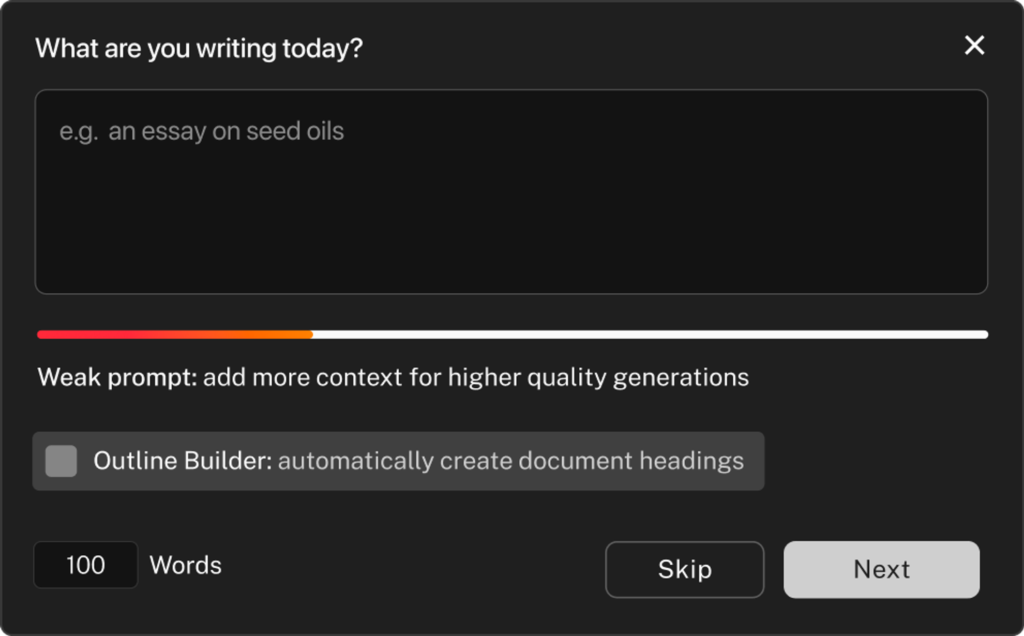
You can think of this console as the ideation station, or ChatGPT but made for writing essays. Here, you can define a prompt for your initial draft. You can also assign a general word count for how long you want the generation to be and even automatically generate an outline with headings within your essay.
Visit this page to learn more about our AI Essay Writer.
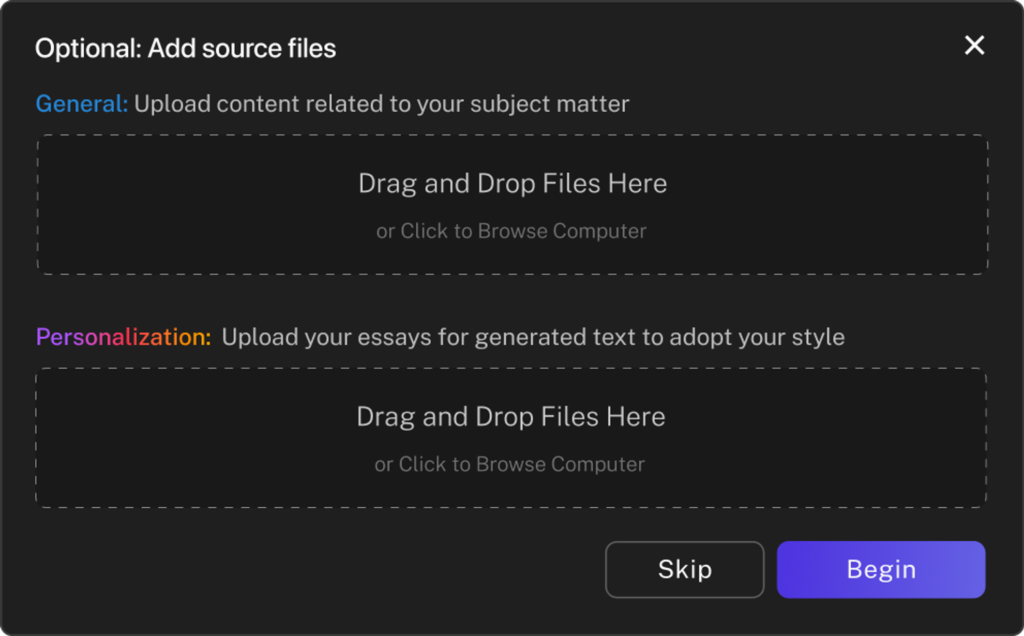
What’s new? You can now even upload source files that determine the content of your initial generation, as well as any past essays/writing samples so generations are in your writing style (Personalization).
Visit this page to learn more about how you can mimic your writing style.
Conch Commands
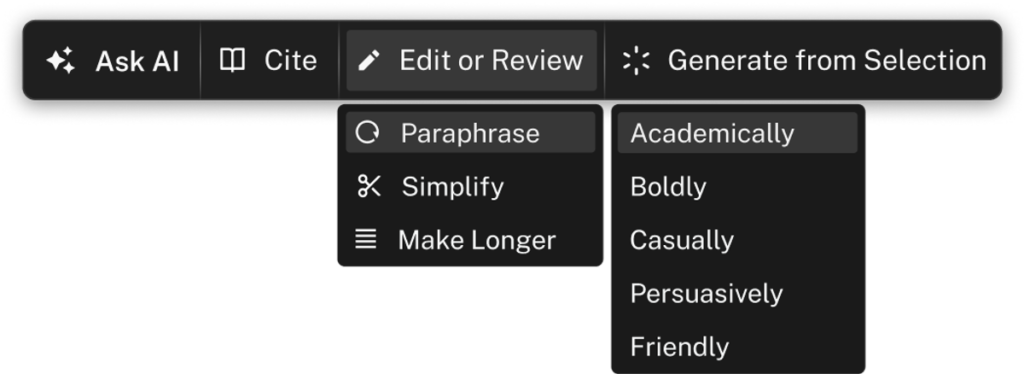
Simply highlighting text will bring up a modal that lets you ask Conch to do anything to the highlighted text from citing with actual research, paraphrasing/rewriting, generating a summary, and more. The possibilities are really endless with the AI commands, but we’ve given you some of the most used ones.
Visit this page to learn more about our AI Outline Generator.
Autocomplete

Don’t have any ideas? Just stop typing for a few seconds and Conch will prompt you to generate your next sentence based on what you have written. You can also use one of our commands: command ⌘ (ctrl on Windows) + shift + Q.
Visit this page to learn more about our AI Outline Generator.
Humanize AI-Written Text with Conch
Check for AI and Humanize
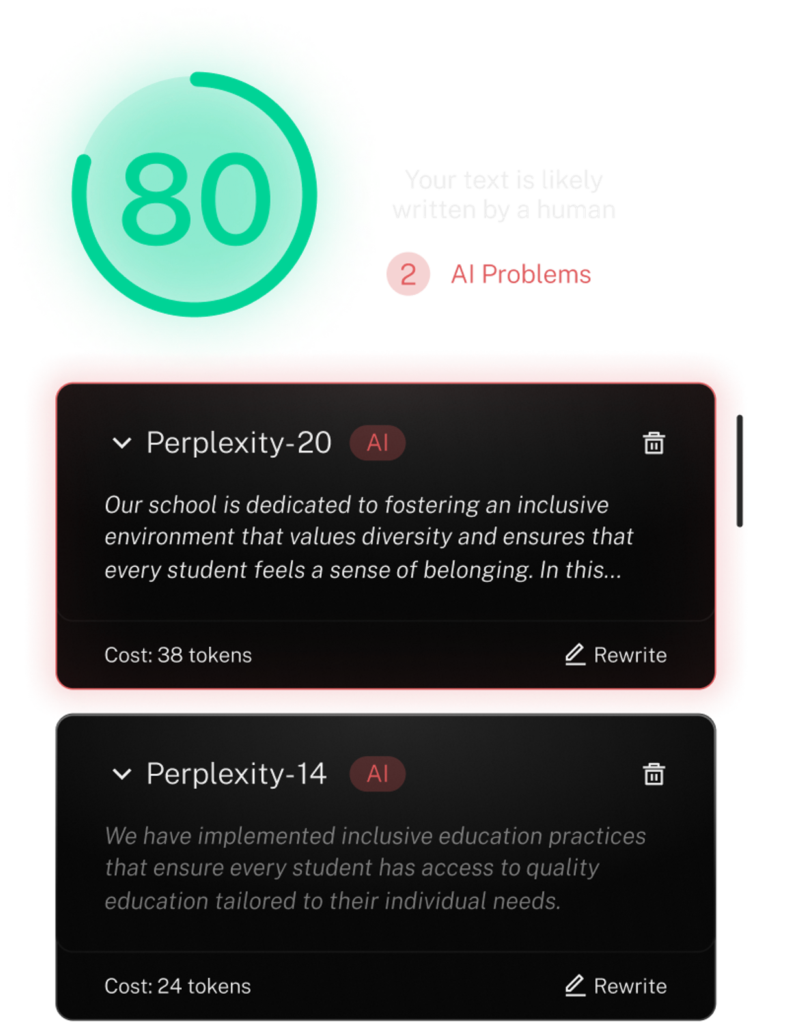
This one’s pretty simple, but one of our most popular features. All you need to do is either click Enhance while in the app dashboard or Check for AI while in write mode. Conch will check for AI detection using some of the top algorithms (GPTZero, TurnItIn, etc.) – you’ll then be prompted to humanize your text. Enhance bypasses 99.99% of AI detectors!
Visit our Enhance page to learn more about our Undetectable AI feature.
Research and Study 10x Faster with Conch
Cramming for a quiz or test? Need to pull insights from a document? Just upload any file (doc, pdf, etc.), YouTube link, or even live record a lecture to:
Generate Notes and Flashcards
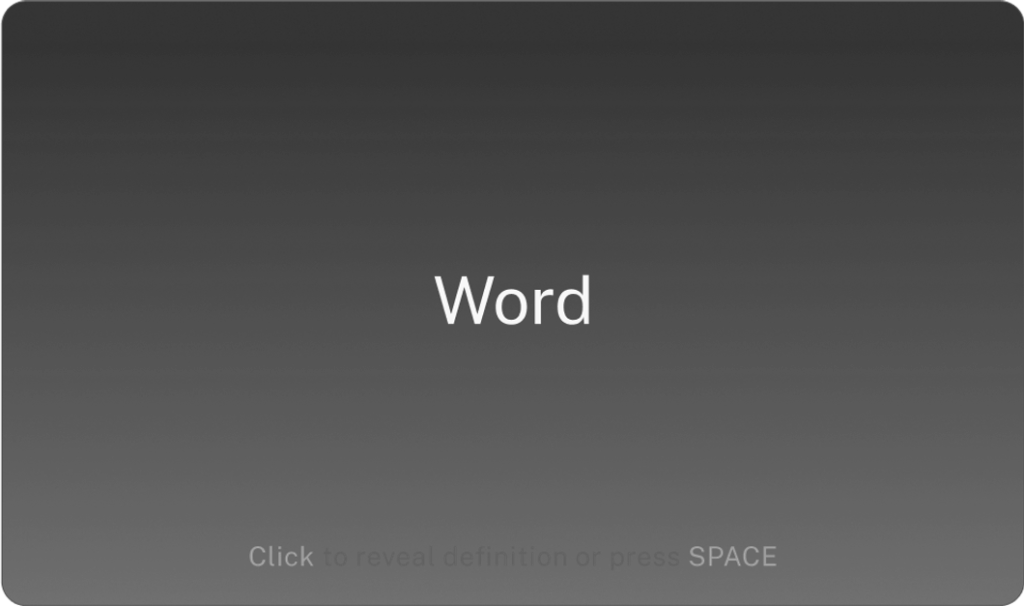
Say hello to the latest addition to Conch where you can create study sets (flashcards and notes) from virtually any file. Upload anything from a textbook to your class notes to a video recording and quickly create easy-to-use, intuitive studying material. Coming soon: You’ll be able to share and find others’ study sets publicly.
Visit our landing page to learn more about how you can chat with any file, auto-generate notes, as well as auto-generate flashcards.
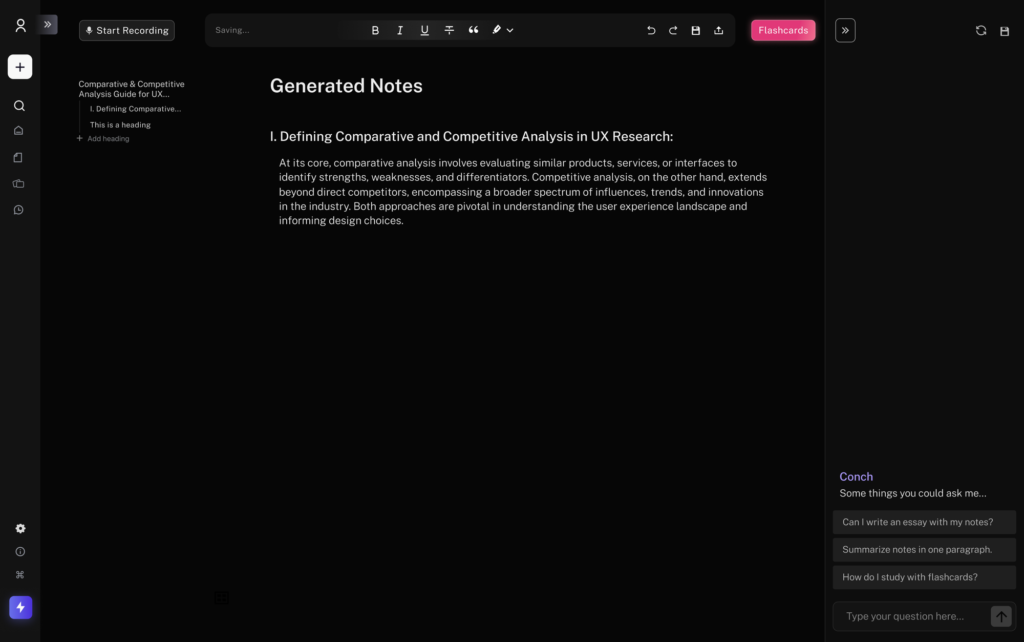
Chat and Analyze
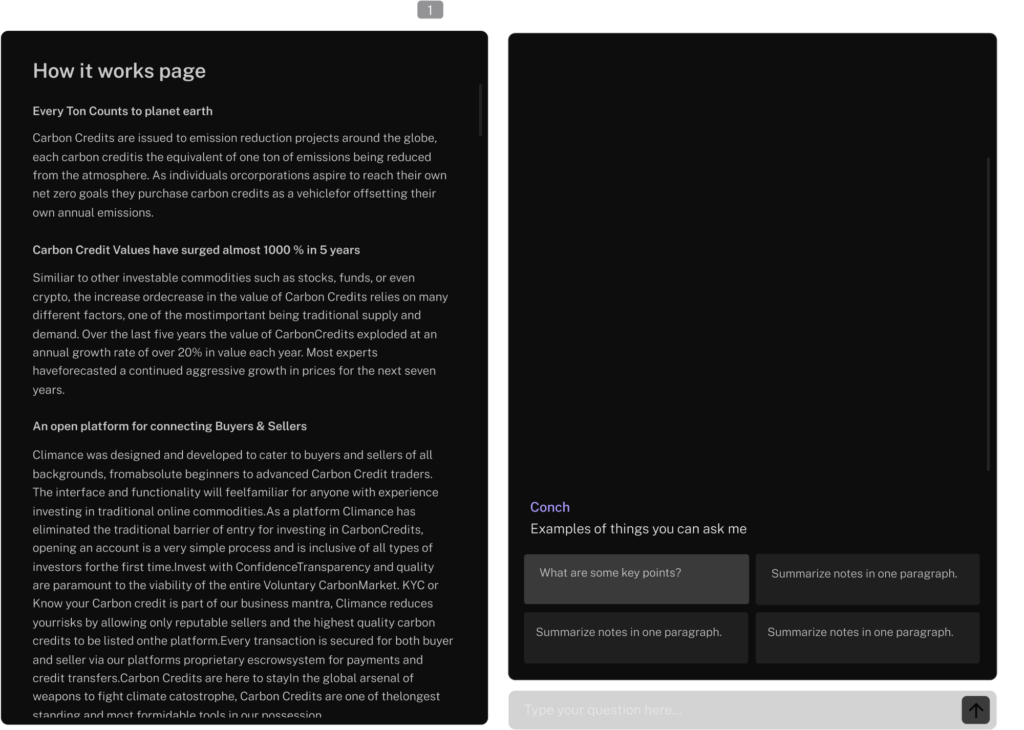
In addition to study sets, you’ll be able to ask Conch questions about the file so you can uncover insights faster. Chat will also follow you around and dynamically adjust based on what mode you’re using Conch in (write, enhance, study), so you basically have an assistant wherever you go when you’re using Conch.
Visit our Chat page to learn more about how you can chat with any file.
Do You Have Any Questions?
Discovered a major bug or experiencing an issue, or need help using a certain feature, shoot as an email.
Best Practice Tips For Learning SAT Vocabulary Words

High-Frequency Words
Starting with high-frequency SAT vocabulary words is essential. These words are crucial for reading passages and answering questions accurately. I recommend learning these words first, as they commonly pop up during the exam. This way, you’ll be better equipped to tackle the SAT’s vocabulary section.
Utilizing Official SAT Resources
To prepare for the SAT, make use of official SAT resources like the Official SAT Study Guide or the official practice tests available on the College Board website. These materials have lists of vocabulary words and exercises tailored to help you get ready for the exam. By using these resources, you’ll have an edge when test day arrives.
Creating a Study Schedule
A dedicated study schedule for SAT vocabulary will work wonders. Plan regular study sessions to focus solely on learning and reviewing vocabulary words. Consistency is key, so set aside specific times each day or week to study these words. By sticking to a routine, you’ll retain the information better.
Practicing in Context
Instead of just memorizing lists of words and definitions, practice using SAT vocabulary words in context. One way to do this is by reading SAT-style passages and identifying unfamiliar words. By determining their meanings based on context clues, you’ll get a better handle on how to use these words effectively.
Tracking Your Progress
Monitor the words you’ve learned and review them regularly. Whether you prefer flashcards, spreadsheets, or a vocabulary journal, it’s crucial to record new words, definitions, and example sentences. Keep tabs on your progress and revisit challenging words to ensure you’re on the right track.
Engaging in Active Learning
Putting SAT vocabulary words to use in your writing and speaking is a powerful way to absorb them. Start by writing sentences or short paragraphs using these words, and try to incorporate them into your everyday conversations. By actively engaging with the words, you’ll reinforce your understanding and retention.
Reviewing and Reinforcing
To strengthen your memory of SAT vocabulary words, regularly review the words you’ve learned. Consider using spaced repetition techniques, where you revisit words at increasing intervals over time. This approach can help cement your knowledge of the material and ensure you’re fully prepared for the SAT.
Related Reading
- How To Study For The Sat
- Sat Reading Tips
- Sat Essay Prompts
- Sat English Tips
- How To Ace The Sat
- Digital Sat Tips
- Sat Math Topics
- Good Sat Score Range
- Sat Math Tips
- Sat Math Formulas
- Sat Math Section
- Sat Writing Tips
- Sat Vocabulary Flashcard
- Sat Reading And Writing
- Sat Grammar Tips
- Ai Sat Prep
- Tips for SAT
- SAT Tips and Tricks
- Last Minute SAT Tips
- Sat Essay Tips
- SAT Study Tips
Write, Study, And Research 10x Faster For Free With Conch AI
Studying new material isn’t easy but tedious, time-consuming, and repetitive. Conch steps in so you can focus on learning. With Conch, you can upload your course material (Upload class notes, documents, lectures, videos, and more) and generate studysets live (Record your lectures, meetings, presentations, or interviews to watch notes and flashcards generate live).
Ensuring Academic Integrity with AI Detection-Free Writing
At Conch, we guarantee that there’s a 99.99% that you won’t get caught after using our tool. If you use ConchAI to write your essays you will be undetected by algorithms like GPTZero and TurnItIn. With Conch, you can write your essays 10x faster, AI detection-free. Our tool helps you add citations, it helps you rewrite content so that it’s undetectable by AI, and so much more, all to protect students’ time and let them focus on actually learning the content!
Simplifying Student Life and Academic Writing
So Chegg users, High School and college students, and anyone writing papers, use Conch to make your student life easier and bypass AI detection tools with ease. Conch has over +1 million users to date and growing.
Sign up and use Conch’s AI Essay writer and Study for free for free today.

Leave a Reply